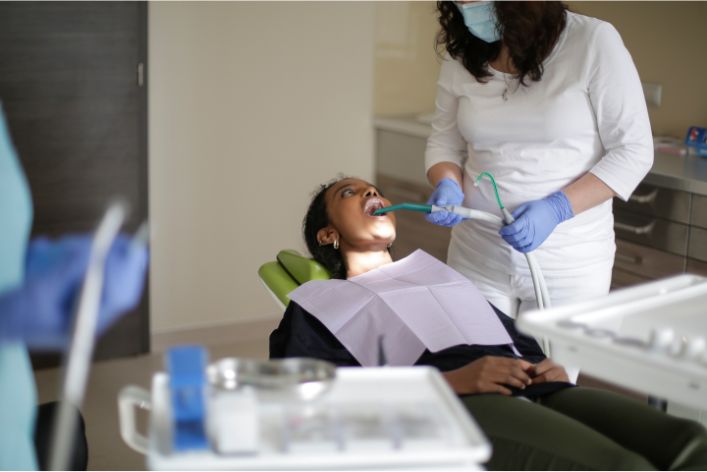Introduction
Dentistry, a healthcare profession that deals with the treatment and prevention of oral diseases, is not given enough recognition in Nigeria.
There are currently over 3,000 registered dentists, yet the profession remains underrated.
The main reason for this is due to limited awareness of the importance of oral health in the country. Most Nigerians only associate a visit to the dentist with pain or discomfort, rather than preventive care.
As a result, the importance of regular dental check-ups is often neglected, leading to a high prevalence of oral diseases like gingivitis and periodontitis.
The insufficient public funding for dental healthcare, coupled with a lack of access to dental care in most parts of the country, is also a contributing factor to the lack of recognition of the profession.
Despite these challenges, many dedicated dentists in Nigeria work tirelessly to promote oral health and provide quality care to patients who come their way.
Through public advocacy and educational programs, Nigerian dentists are trying to raise awareness about the importance of dental healthcare.
It is important that the government and other stakeholders invest in the dental profession and provide adequate resources to enhance access to oral healthcare in the country.
The impact of dental care on general health cannot be overemphasized, and it is time for the dentistry profession in Nigeria to get the recognition it deserves.
Importance of Dentistry
Dentistry, though often underrated, plays an essential role in overall healthcare and well-being.
Neglecting dental health and oral hygiene may lead to a host of problems, affecting both physical and mental health.
The following are some of the reasons why prioritizing dental health is of utmost importance:
The overall importance of dental health and oral hygiene
- Prevents tooth decay, gum disease, and bad breath
- Contributes to a healthy and beautiful smile
- Helps maintain overall physical health
- Boosts self-esteem and confidence levels
- Prevents tooth loss and maintains healthy teeth and gums
How dental health impacts overall health and well-being
The mouth is a breeding ground for harmful bacteria.
Poor oral hygiene can result in the buildup of plaque and tartar, leading to infections, cavities, and gum disease.
These dental problems, if left unattended, may have far-reaching consequences for overall health and well-being. Studies have linked poor dental health to:
- Cardiovascular disease
- Diabetes
- Respiratory problems
- Stroke
- Dementia
- Complications during pregnancy and childbirth
Furthermore, dental problems may lead to chronic pain and discomfort, affecting one’s ability to eat and speak properly.
This may have an adverse impact on one’s mental health, leading to depression, anxiety, and other psychological problems.
Read: Spotlight on Psychiatry: Mental Health in Nigeria
Role of Dentists in promoting good oral health care practices
Dentists and oral health care professionals play a vital role in promoting good oral hygiene practices.
Regular dental checkups, hygiene instruction, and preventive services can help maintain dental health and prevent a host of dental problems.
Dentists can also provide emergency care, restorative treatments, and cosmetic services to improve the health and appearance of one’s teeth and gums.
Furthermore, dentists can educate patients on the importance of maintaining good oral hygiene practices at home.
This includes brushing teeth twice a day, flossing regularly, using mouthwash, and avoiding unhealthy foods and drinks that may contribute to dental problems.
Basically, dentistry is an essential healthcare profession that should not be overlooked or underrated.
Good oral hygiene practices can prevent a host of dental problems and contribute to overall health and well-being.
Dentists play a vital role in promoting good oral care practices and maintaining dental health. It is, therefore, important to prioritize dental health and seek professional dental care regularly to maintain healthy teeth and gums.
Read: Role of Pharmacists in Nigeria’s Evolving Healthcare System
Challenges Faced by Dentists in Nigeria
Dentistry is an essential branch of healthcare that focuses on the prevention, diagnosis, and treatment of oral diseases.
In Nigeria, however, it is an underrated profession that faces various challenges. Here are some of the challenges faced by dentists in Nigeria:
Limited Access to Resources Such as Dental Equipment and Tools
One of the significant challenges faced by dentists in Nigeria is the limited access to resources such as dental equipment and tools.
Many dental clinics in the country lack basic dental equipment, such as X-ray machines, dental mirrors, and drills, which makes it challenging to provide quality dental care.
This shortage of resources is due to a lack of investment in the dental healthcare sector by the government.

High Cost of Dental Care Which Limits Access to Care for Many Nigerians
The high cost of dental care is another significant challenge faced by dentists in Nigeria. Many Nigerians cannot afford to pay for dental treatment due to the high cost, which limits their access to care.
This situation is particularly prevalent among low-income earners and those living in rural areas, where dental care is often scarce.
As a result, dental issues, such as cavities and gum disease, often go untreated, leading to more severe oral health problems.
Inadequate Funding for Oral Health Programs and Initiatives
Another significant challenge faced by dentists in Nigeria is inadequate funding for oral health programs and initiatives.
The government does not allocate enough funds to the dental healthcare sector, which means that there is a lack of awareness campaigns and oral health education programs.
This situation has led to a limited understanding of the importance of oral health, leading to poor health-seeking behaviors in Nigeria.
Dentistry is an essential healthcare profession that is often underrated in Nigeria.
Dentists face several challenges, including limited access to resources such as dental equipment and tools, high costs of dental care, and inadequate funding for oral health programs and initiatives.
It is crucial for the government to invest adequately in the dental healthcare sector to improve access to care and raise awareness of the importance of oral health among Nigerians.
Read: Nursing in Nigeria: A Comprehensive Career Guide
Potential solutions to address challenges faced by dentists
The field of dentistry faces several challenges in Nigeria, including inadequate funding for dental health programs, limited access to dental care, and a shortage of skilled dentists.
To address these challenges, several potential solutions can be implemented, including:
- Increased Government Funding for Dental Health Programs: One of the most effective ways to improve the state of dentistry in Nigeria is to increase government funding for dental health programs. This can help to improve the quality of dental care provided to citizens, as well as increase the number of practicing dentists in the country.
- Implementation of Community-Based Programs and Outreach Initiatives: To increase access to dental care in Nigeria, community-based programs and outreach initiatives should be established. This can involve setting up dental clinics in rural areas, providing dental care to low-income communities, and conducting awareness campaigns to educate citizens about dental health.
- Collaboration with International Organizations: Collaboration with international organizations can provide Nigerian dentists with additional resources and training opportunities. This collaboration can help to improve the overall state of dentistry in Nigeria, as well as increase the number of skilled dentists practicing in the country.
Increased Government Funding for Dental Health Programs
Governments, both at the federal and state level, need to allocate more funds to dental health programs.
This can help to improve the overall quality of dental care provided to citizens, as well as increase the number of practicing dentists in the country.
The government can also provide financial support to dentists, especially those in rural areas, to help them establish dental clinics and purchase necessary equipment.
Read: How to Become a Medical Lab Technician in Nigeria
Implementation of Community-Based Programs and Outreach Initiatives
To increase access to dental care in Nigeria, community-based programs and outreach initiatives should be established.
This can involve setting up dental clinics in rural areas, providing dental care to low-income communities, and conducting awareness campaigns to educate citizens about dental health.
These programs can be run by public-private partnerships or non-governmental organizations that work towards improving access to dental care.
Collaboration with International Organizations
Nigerian dental associations collaborating with international organizations provide dentists resources, training, and access to advanced technologies.
International organizations also offer funding to enhance dentistry in Nigeria. Collaboration facilitates dentist participation in conferences and workshops, enhancing knowledge and skills.
Improving dentistry in Nigeria requires joint efforts from the government, healthcare providers, and industry stakeholders.
Read: Unfolding the Vast World of Healthcare Professions in Nigeria
Conclusion
Dental health is of vital importance, and dental professionals play a crucial role in ensuring that Nigerians have access to quality dental care.
Despite the challenges faced by the dental profession in Nigeria, including inadequate funding, lack of infrastructure, and poor remuneration, there are potential solutions that can help improve the situation.
By promoting public awareness of the importance of dental health, investing in dental education and training, and strengthening the dental workforce, it is possible to increase access to care for Nigerians and elevate the status of dentistry as a healthcare profession in Nigeria.
Therefore, it is essential for the government, policymakers, and stakeholders to work together to address the challenges facing the dental profession in Nigeria and ensure that Nigerians have access to quality dental care.




